Did you know that your data has hidden secrets that can skyrocket your business?
Organisations create huge amounts of data every day- user activity logs, sales transactions, and consumer complaints. Yet actionable insights prove tough to extract. SQL-based analytics with static dashboards becomes a time-consuming and specialised task that utilises far too many skills.
Only 25% of workers use business intelligence solutions actively on average, and most queries take analysts minutes to write and verify. This technical drag prevents real-time decision-making and leaves the majority of teams reliant on rare data experts.
Find out how you can be one of the smart companies that let their data guide them on a path to success- no SQL knowledge required. Your sales team, your business developers, and even your non-tech teammates can all leverage your company data to take it to new heights.
Introducing TST Technology’s AI Agent
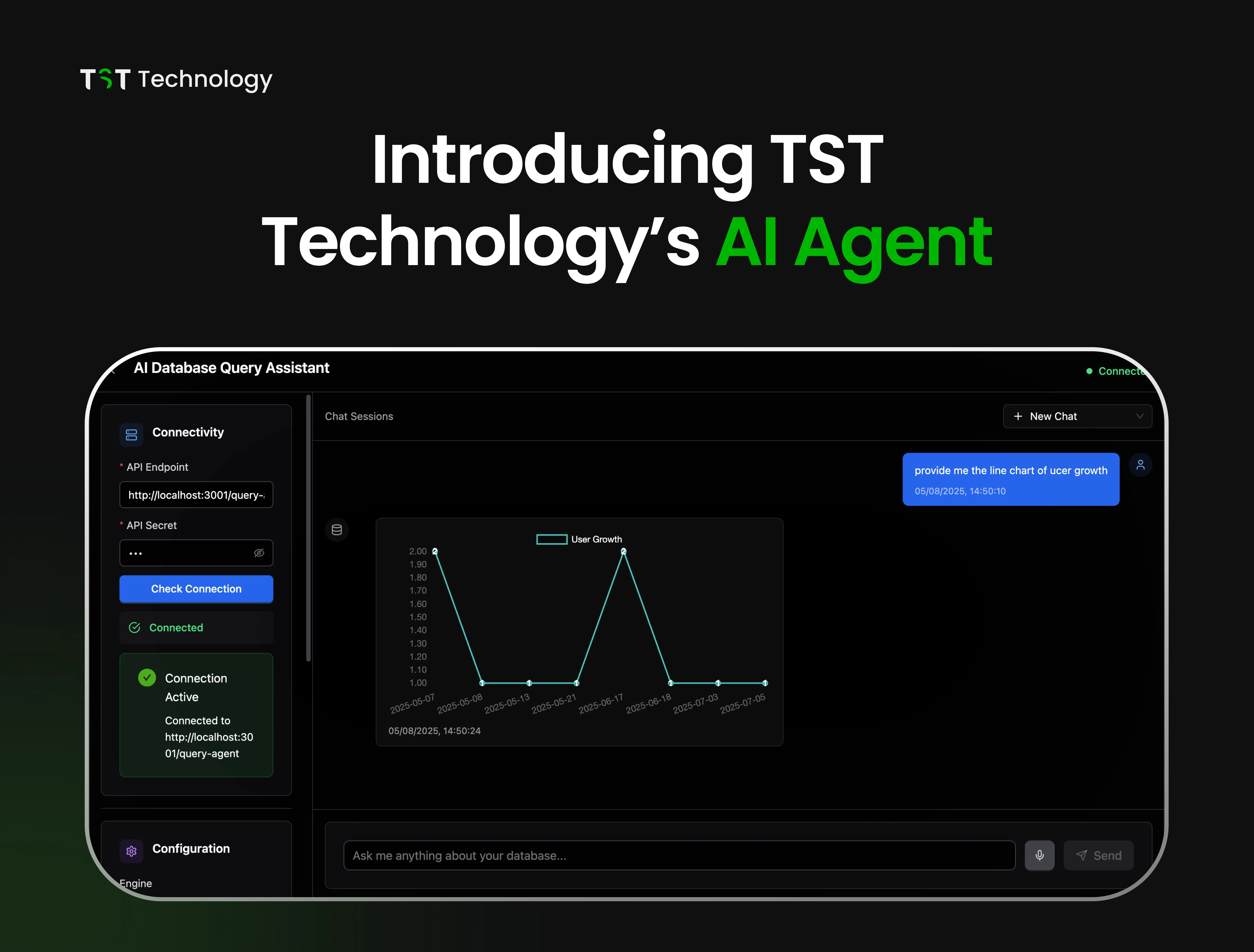
TST Technology meets the data interaction demand with its AI Agent: an interactive AI database assistant tool that allows anyone to communicate with their data as easily as texting a coworker.
By converting everyday language into accurate queries and immediately seeing results, the AI Agent disentangles technical snares and speeds insight discovery.
Why Most Companies Waste Their Data Insights?
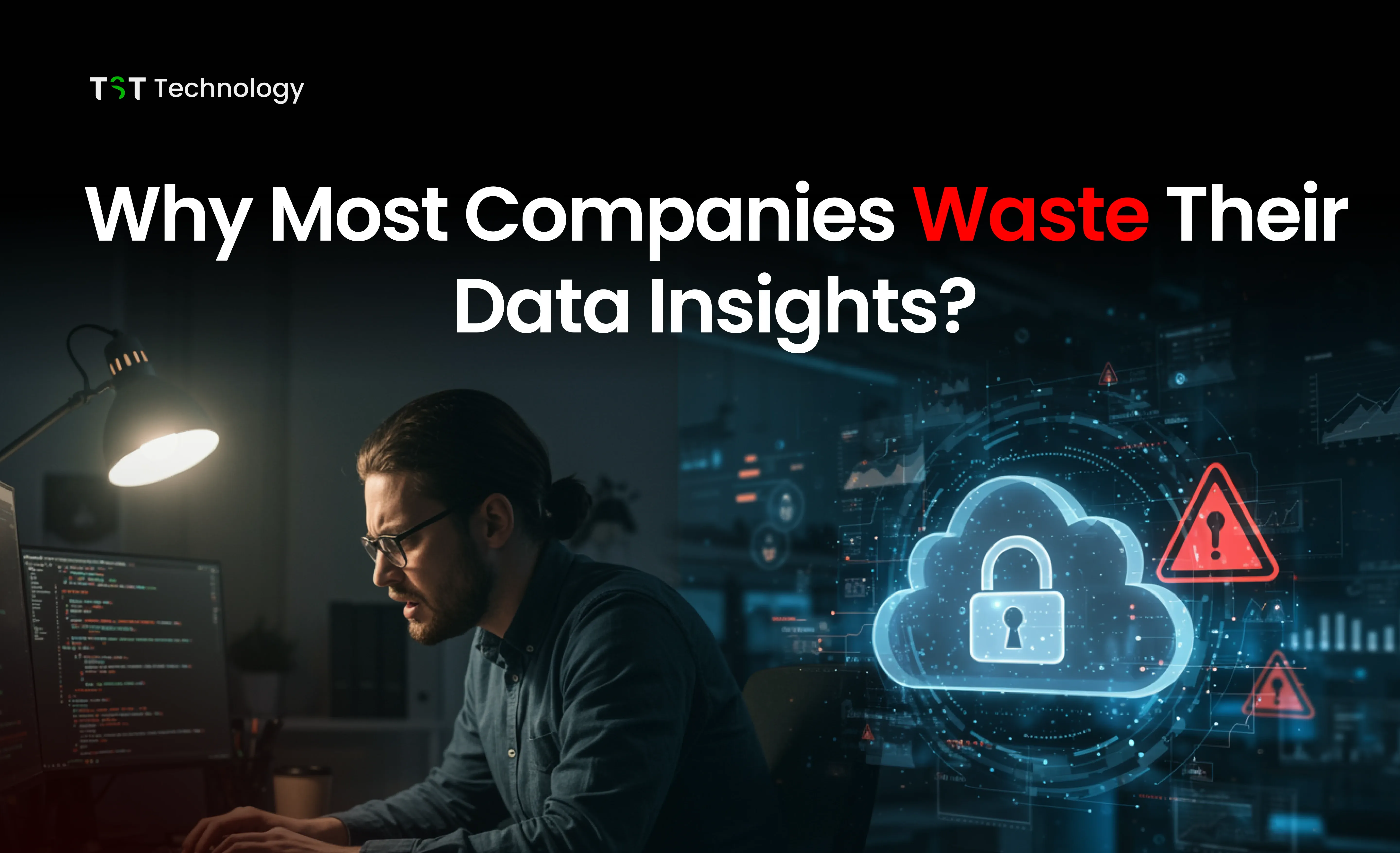
Legacy SQL and BI solutions put a large amount of technical weight on business users. The query construction may take a matter of minutes, and dashboards require ongoing upkeep and data modelling.
Additionally, most companies are reluctant to move to cloud-based analytics due to data privacy and regulatory issues. Sending sensitive data off-premises involves risk, particularly in industries such as finance and healthcare. Concerns regarding data privacy and compliance drive most organisations to be hesitant in embracing cloud-based analytics.
How does TST Technology’s AI Agent get accurate Data Insights For You?
TST Technology's AI Agent is an AI database assistant software that revolutionises database interactions using a conversational interface with no SQL expertise needed.
At its heart, the AI data analysis tool uses sophisticated natural language processing to parse plain-language queries, create accurate database commands, and display results instantly.
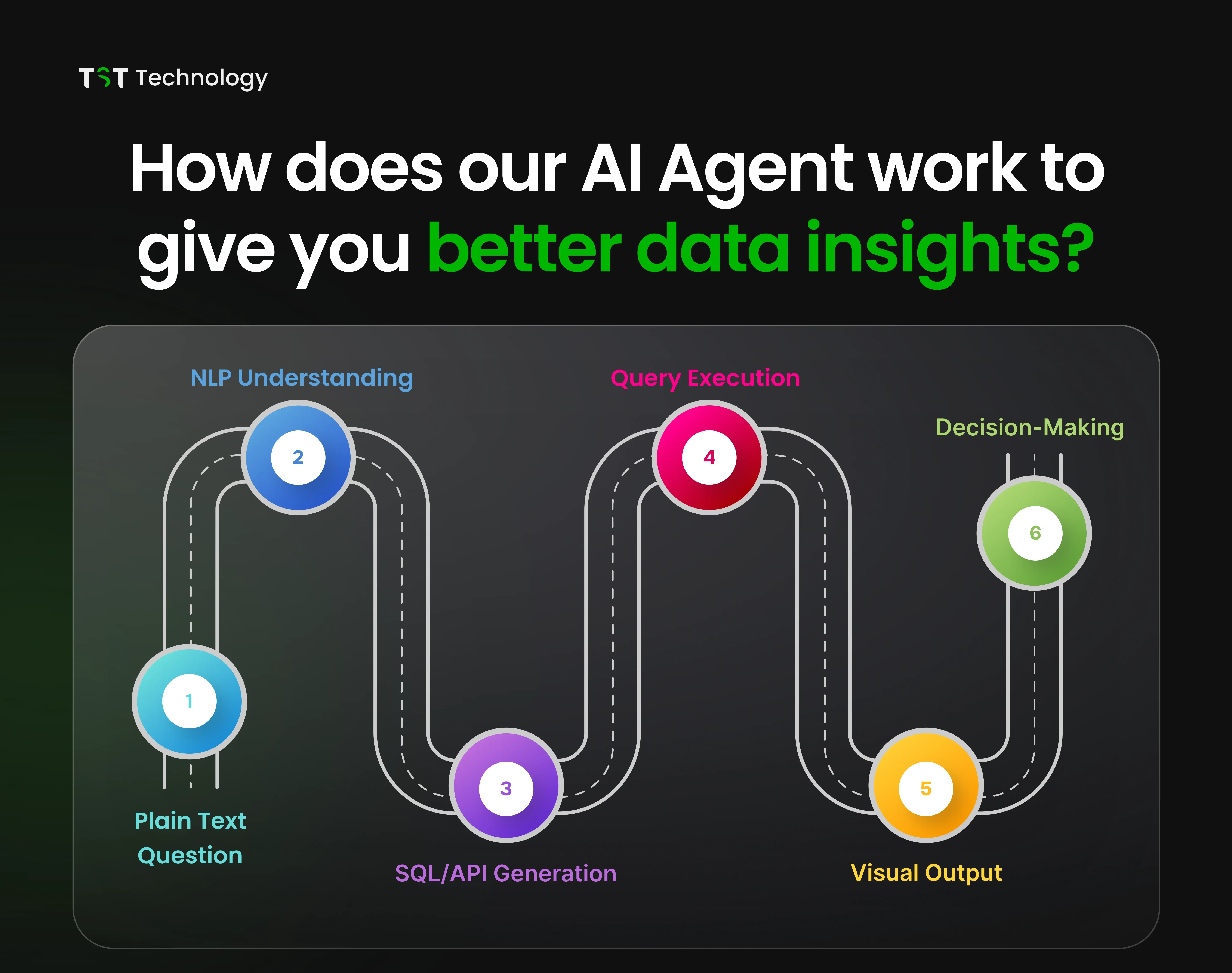
Its primary features are:
1. Natural-Language Querying
Users query with questions such as "What number of new signups yesterday?" or "Display a seven-day user growth chart," and the AI Agent converts them to optimised queries. In contrast to the SQL skills required by conventional BI tools, TST Technology's AI Agent allows users to ask questions using regular language and automatically converts them to accurate database queries. This removes technical obstacles and enables non-technical teams to self-service their analytics requirements.
Additionally, by integrating the AI Summarize API, teams can quickly generate concise insights and summaries from complex datasets without writing any code.
2. Real-Time Visualisation
Responses are returned both as short answers and as dynamic visualisations (bar graphs, line plots, or KPIs), so results are instantly apparent. By integrating analytics into discussions themselves, teams have instant clarity, avoiding the latency of manual dashboard building and minimising time-to-insight as they get real-time graphic visualisation.
3. Local-First Architecture
Everything is processed on-premises or in your own environment, providing data privacy and compliance. With local-first design, these issues of privacy and compliance are addressed, which fits the 82% of organisations that value on-device AI deployments for better data sovereignty.
4. No-Code Integration
Integrate your database in minutes without coding effort; the AI Agent learns any schema automatically. Organisations can integrate databases in minutes, and the system learns to fit any schema. This no-code approach mirrors the 77% adoption rate of no-code/low-code platforms, enabling fast deployment without IT constraints.
5. Role-Based Access Control
Establish read-only or custom permissions for each user or team to ensure governance and security. This ensures that only teams view the data they're supposed to see, ensuring governance and auditability without compromising usability.
How does our AI (Database) Agent work to give you better data insights?
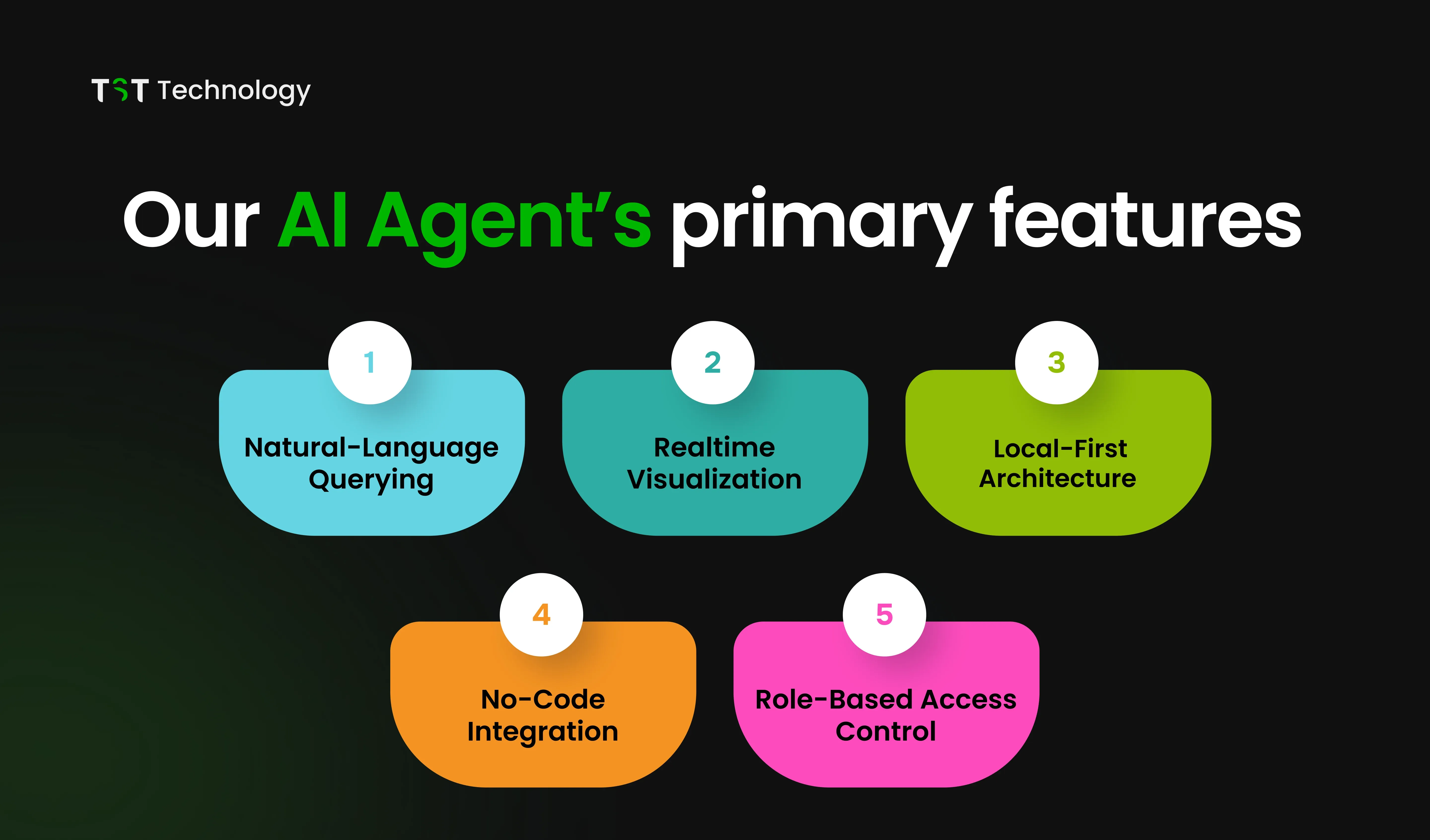
When a user makes a natural-language query, the AI Agent's NLP processor analyses intent and context, builds an optimised SQL or API query, runs it against the connected data source, and the results are delivered in both written format and visual representations.
This end-to-end pipeline from natural language to actionable visualisation makes data accessible and speeds up decision-making throughout the organisation.
Get the AI Agent Setup on Your System
- Book a Demo Call with our team here.
- Our team sets up the AI Agent in your system, explaining all steps to you.
- The AI Agent is connected to your backend.
- You get all your answers once you start communicating with your database.
Pro tip: Train the model slowly by increasing the level of complexity of questions gradually. This process helps the model gain deeper insights into the database, leading to more accurate and relevant responses.
Book a FREE call with our team to get custom pricing for all your needs.
Growth of AI-Powered Database Query Tools in 2025
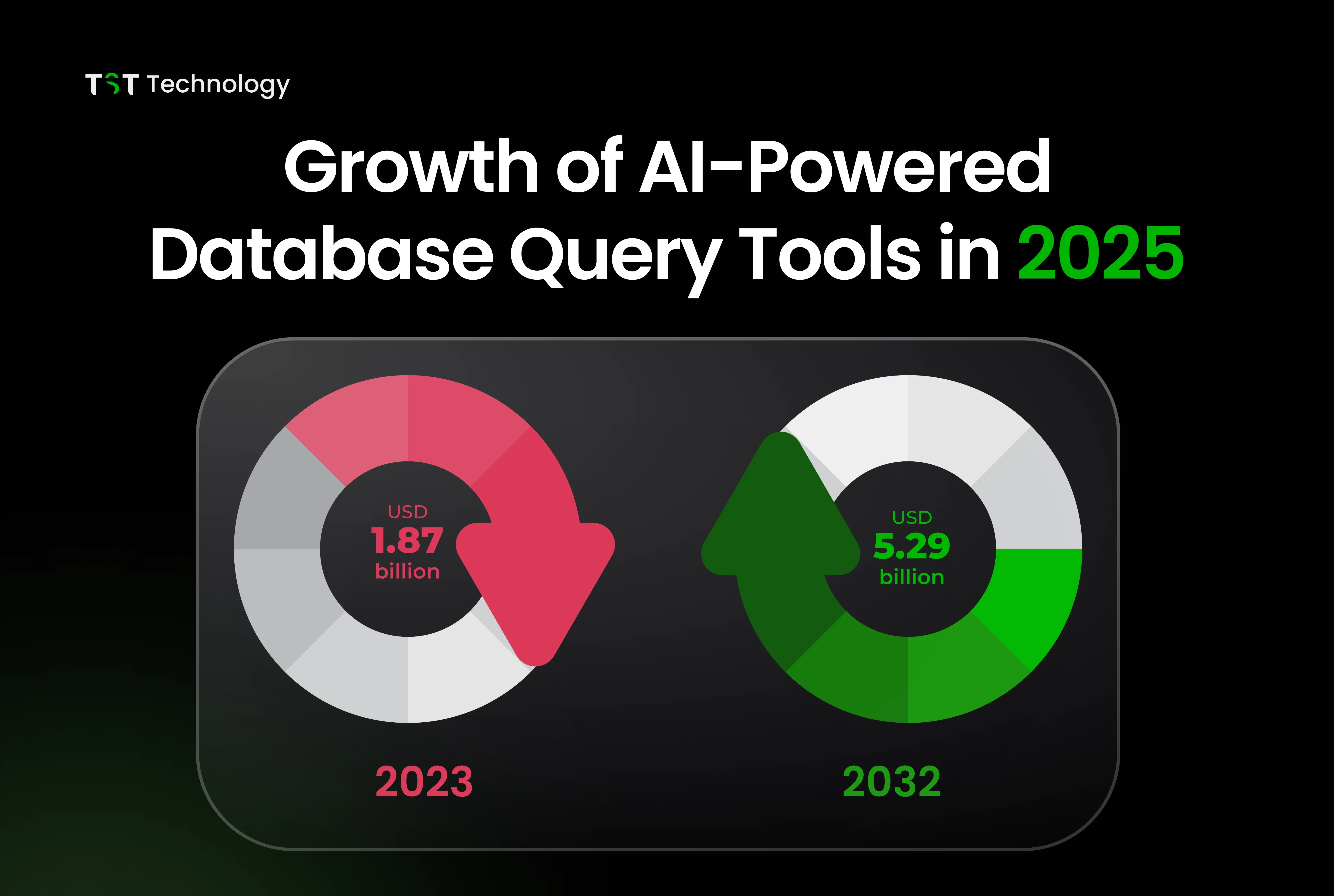
The AI-driven database query tool market is growing as businesses aim to make data more accessible and speed up insight discovery.
- In 2023, the global AI-driven analytics tools market was worth USD 1.87 billion and is expected to grow to USD 5.29 billion by 2032, with an 8.2% compound annual growth rate.
- This expansion mirrors universal demand for technology that allows business users to work with sophisticated data in natural language instead of typing SQL or relying on expert analysts.
As businesses give more emphasis to agility and self-service analytics, AI-fueled database query tools are quickly becoming integral parts of contemporary data strategy.
What Does The Future Hold for Data Analytics?
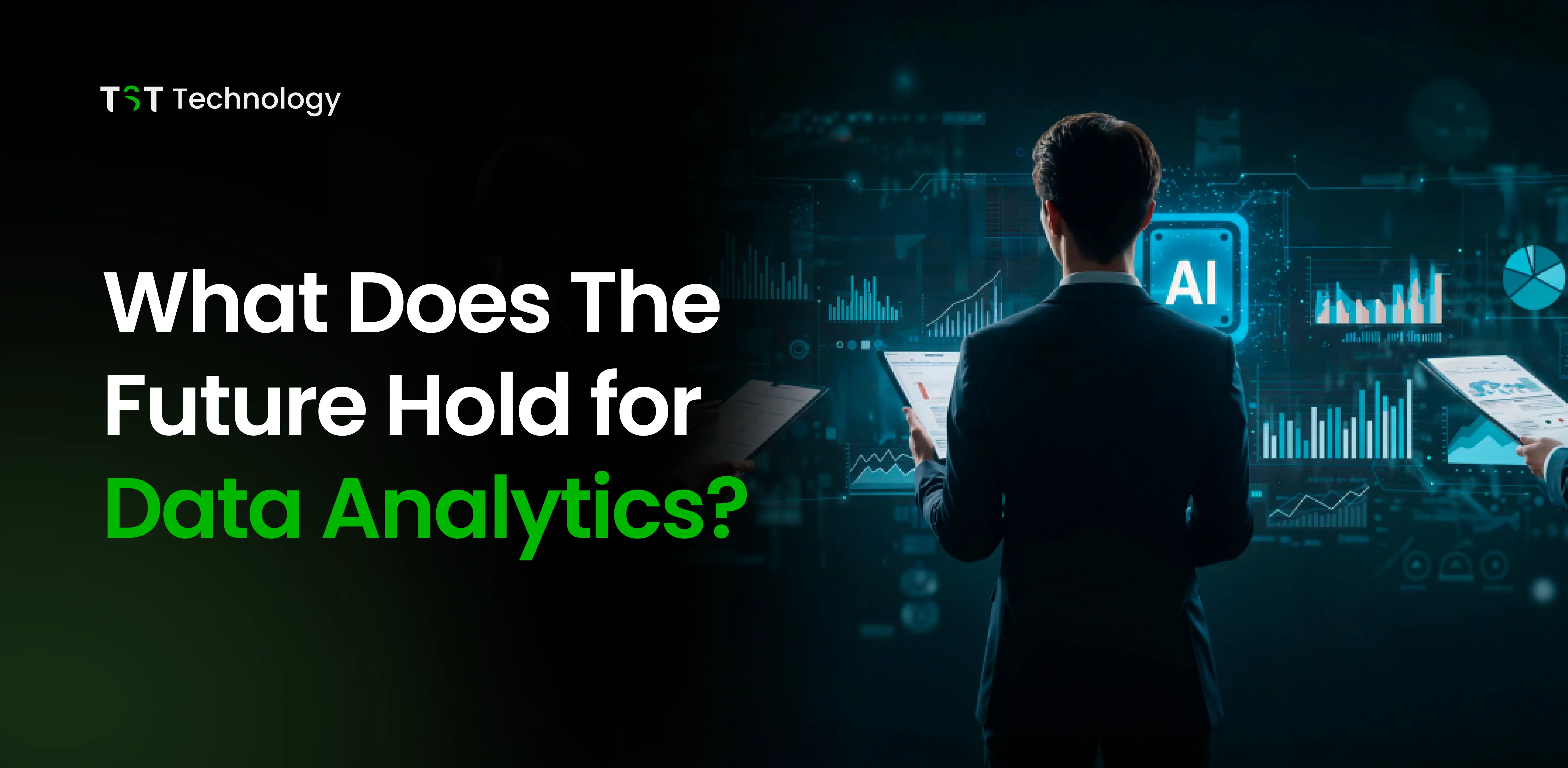
The future of analytics will truly be seamless and conversational access to data at all levels of an organisation. As large language models improve, platforms for querying databases using plain language will be more accurate, minimising the need for human verification and building confidence in automatic insights.
Businesses will move towards decentralised analytics, where business users autonomously investigate data sets by themselves with AI-fueled database query interfaces, leading to accelerated decision cycles and innovation. With local-first architecture guaranteeing privacy and compliance, these systems will bring about a future where data literacy is ubiquitous and actionable insights at the pace of chat.
Conclusion
If you're not fully leveraging your data, you're giving your competitors a serious edge. You don’t know the hidden trends, the pitfalls and the goldmines in your own company without reading the data that gives you all the answers.
To gain the maximum insights from your data to grow your company, book a demo of our AI Agent and find out what your data is telling you.
At TST Technology, we’re committed to helping you unlock your full potential. Are you ready for your superfast growth?






